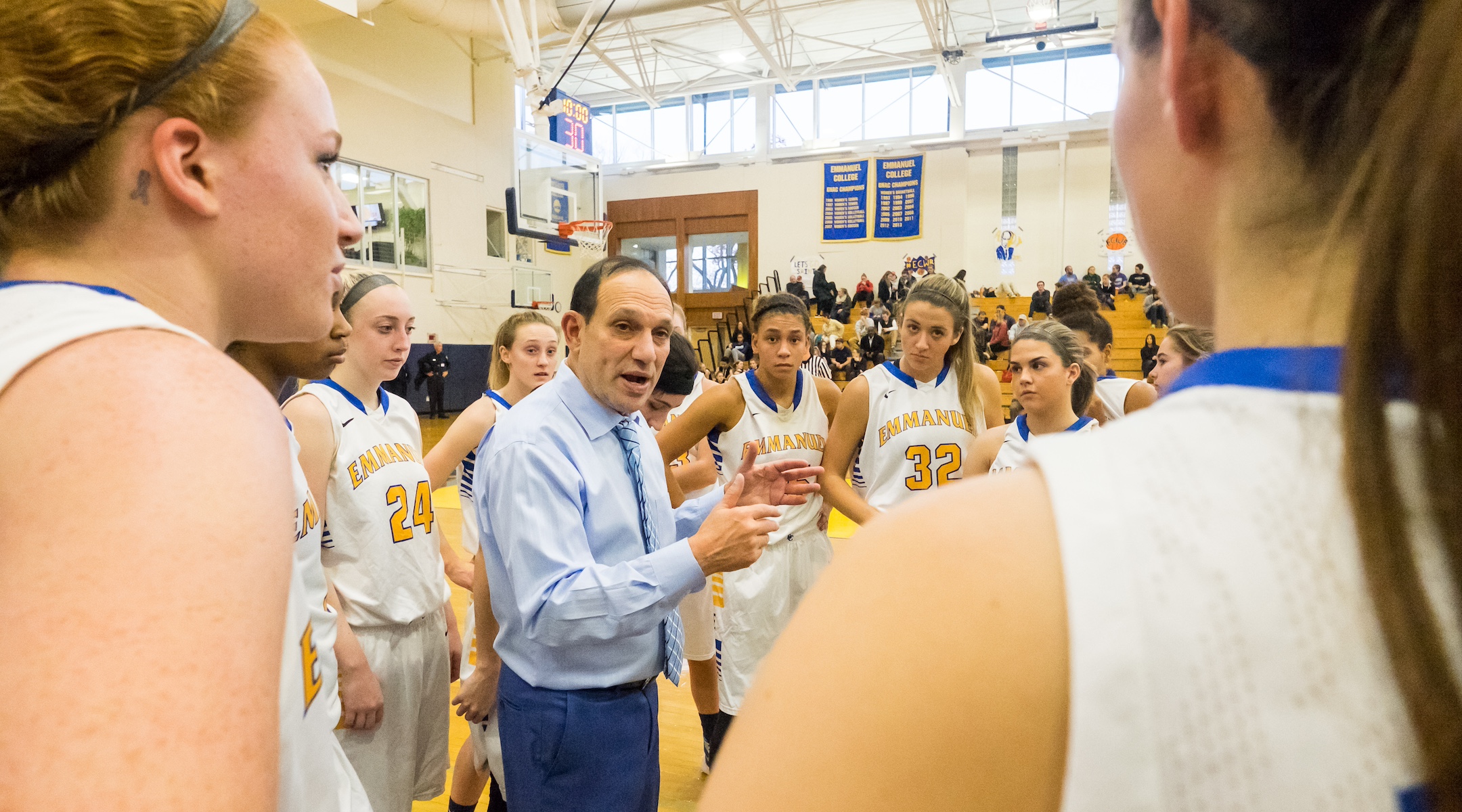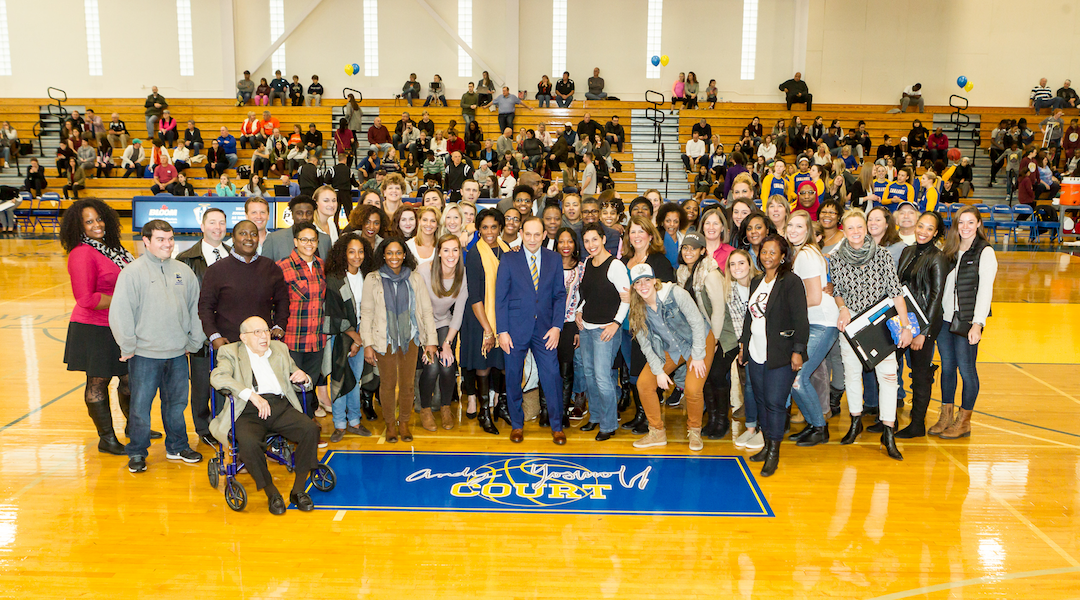After 47 years and 900 wins, this Jewish basketball coach is a legend at his Catholic college
The court at Emmanuel College in Massachusetts is named for Andy Yosinoff

BROOKLINE, Mass. (JTA) — Andy Yosinoff departs his prayer service at Congregation Kehillath Israel shortly after 8 a.m. every Thursday during the college basketball season, navigating across the Boston city line.
For nearly 50 years, the Reform Jew has commuted to what’s become his life’s calling: coaching the women’s basketball team at a small private Catholic college.
Yosinoff, 76, is the second-longest tenured employee at Emmanuel College (a philosophy professor has been there longer) and one of the school’s pillars.
“Emmanuel’s been my life,” Yosinoff told the Jewish Telegraphic Agency of his 47 years at the school. “I wouldn’t be where I am if I wasn’t at Emmanuel. They allow me to be Andy Yosinoff, who doesn’t always do things in the most conventional ways.”
The all-time winningest Jewish college basketball coach at any level for both men and women with 898 wins, Yosinoff is also the country’s longest-tenured active college basketball coach, according to the NCAA. His Saints have garnered 21 NCAA tournament appearances and 18 Great Northeast Athletic Conference (GNAC) championships in his nearly five decades leading the Division III program. In addition to heading the women’s hoops program, Yosinoff served as the director of athletics at Emmanuel for 17 years; he is now an associate athletic director and the department’s business manager and athletic alumni development liaison.
“Even as a practicing Jewish person, Andy really embodies the mission of Emmanuel College,” said Beth Ross, the college’s president. “I can’t think of a better advocate or somebody who is more passionate or committed to developing student scholar-athletes.”
Yosinoff grew up in Pawtucket, Rhode Island, the only child of Freda and Louis Yosinoff. His family kept a kosher home and attended the Conservative Temple Emanu-el in Providence, where he later had his bar mitzvah. He still attends services there when he can, usually for the High Holidays.
That Yosinoff ended up a basketball coach is a surprise on its own. While he played varsity high school hoops “not great, pretty good,” he said, tennis was Yosinoff’s better court sport. Playing Division I tennis at the University of Rhode Island as the school’s first scholarship tennis athlete, Yosinoff held the top singles position on the men’s tennis team all four years and is in the school’s athletic hall of fame.
While at URI, he caught the coaching bug, pioneering the school’s intramural basketball team. Yosinoff continued coaching a YMCA team while obtaining his master’s at Miami University (Ohio) and developed the defensive schemes his teams still use today. He moved to Boston soon after, teaching physical education in Boston public schools and coaching basketball within the system.
One day, an advertisement in the Boston Globe caught his eye: a tennis coaching job at Emmanuel, then a women’s school.
Yosinoff applied immediately, but after meeting with the school’s part-time athletic director, he realized he couldn’t take the role because the hours overlapped with his teaching job. Yosinoff quickly pivoted, asking if Emmanuel had a basketball coach.
The answer?
“No.”
“You do now,” he responded.
Yosinoff’s Saints found success not long after his arrival in 1977, 10 years before the introduction of the 3-point line, and they never looked back. Their best season to date came midway through his career in 2001, when Emmanuel reached the NCAA Final Four, becoming the first Boston school to do so at any division, men or women. He’s the NCAA Division III record holder for 20-plus victory seasons, with 27, and one of 10 NCAA women’s basketball coaches across all levels to reach 900 wins. Yosinoff coached the Saints to 72- and 68-game regular-season conference winning streaks from 2000-2006 and 2010-2016. He won the 2012 Jewish Coaches Association’s Red Auerbach National Coach of the Year Award and was a finalist a decade later. Yosinoff has also coached in the Maccabiah Games in Israel. The list of accolades goes on.
To boot, Yosinoff also coached women’s tennis at Emmanuel from 1980-1987. He became Emmanuel’s athletic director in 1986, while continuing to teach in the public schools and coaching women’s basketball and tennis. He retired from teaching in 2007 and has been full-time at Emmanuel since.

Perhaps Yosinoff’s most important accomplishment, though, came as an assist, when he helped then-freshman Lesa Dennis petition the NCAA to allow the devout Muslim to wear sweatpants and a scarf to cover her head during games in order to adhere to religious customs in the mid-1980s. Recently, Jamad Fiin, a 2022 graduate, rose to influencer status and viral fame for her empowering content as a female Muslim college basketball player.
Now, Lesa Dennis-Mahamed is a Roxbury, Massachusetts-based optometrist. She described Yosinoff as “an asset to the human race.”
“He is an advocate,” Dennis-Mahamed said. “Even though there can be some stress between Muslims and Jews, Andy doesn’t see that. He sees people as human. Andy looks beyond race, color, religion or even gender, and he sees the person for who they are.”
Yosinoff’s father Louis, who attended synagogue daily for 25 years, worked as a guidance counselor in Providence’s City Central High School, teaching his son about the importance of diversity and inclusion. Louis had started a scholarship fund at Emmanuel in honor of his wife, who died of muscular dystrophy at 65 in 1986.
Last year, Andy Yosinoff redid the gym’s bleachers in honor of his father, who died in 2017 at age 99 and was known as “Papa Yosinoff” to the team. A yellow seat in the middle seat of the first row honors Louis Yosinoff. The others are blue.
The Sisters of Notre Dame de Namur, the school’s founding order, emphasize the importance of equity, too, he said.
“It’s about giving inner-city kids opportunities to go to school. It’s essential for me, and was for my father back in the day,” Yosinoff said. “I’m more proud of how diverse our teams have been than all the wins in the world.”
As a dogged recruiter, Yosinoff can be seen in action all over northern New England. Joe Walsh, now the GNAC’s commissioner, got the Yosinoff pitch on a Friday evening in the summer of 1972 while shooting around in Allston’s Ringer Park by himself. Yosinoff approached then-15-year-old Walsh.
“I’m the coach of the Jewish Community Center basketball team,” and I need some players, Yosinoff told Walsh.
“I’m not Jewish,” Walsh said.
“I don’t care,” Yosinoff responded.
“The starting 5 was four Irish kids and one Jewish kid,” Walsh said. “You don’t get 900 wins as a college coach if you can’t recruit.”
Ross, Emmanuel’s president, remembers first meeting Yosinoff 23 years ago on the campus quad, located in the heart of Boston’s Fenway neighborhood, forming an instant friendship because of Yosinoff’s infectious energy.
“There isn’t a person on campus that doesn’t know Andy,” she said.
Ross credited Yosinoff for fostering an inclusive environment in his program while also holding his players to high standards, evidenced by their strong grade point average and Women’s Basketball Coaches Association (WBCA) Team academic honors.
Kiera Eubanks, a current senior captain, remembers Yosinoff’s two-part recruiting promise as follows: First, if she joined the program, she’d win a championship. Second, he would do everything he could to help her find professional opportunities after college.
“He’s constantly checking up on us, also making sure that we’re succeeding off the court, and I certainly have felt supported during my four years here,” said Eubanks, a sociology major. “I wouldn’t change it for the world. He truly has made my college experience that much greater, and he truly cares about us.”
Meghan Kirwan, a 2012 graduate, joined Yosinoff’s staff as an assistant two years after graduating. She’s now in her ninth season in the part-time role.
“As a player I enjoyed it so much, so when he was looking for another assistant coach there was no one I’d rather coach under,” said Kirwan, who also works in the nearby Somerville Public Schools as a reading specialist. “He takes it very seriously and wants to win, but there’s such a free and fun lightness about him. Year after year I’m still here, and I wouldn’t want to be anywhere else.”
Already a member of the New England Basketball and Great Northeast Athletic Conference halls of fame, Yosinoff has since November 2016 had his name inscribed on the school’s basketball court — “maybe the only Jewish coach with his name on a Catholic college floor,” he said.
He eyes three more accomplishments: a national championship, a place in the Naismith Memorial Basketball Hall of Fame (which includes NBA stars) and 1000 career wins, in that order.
With a list that like, he clearly is showing no signs of slowing down.
“If I feel like I do today, which is the same energy as it was 45 years ago, and feel like I’m doing a good job helping my players get better, I can’t give you an age” to retire, Yosinoff said. “If I didn’t love the place, I’d be like a normal person and retired.”
This article originally appeared on JTA.org.













